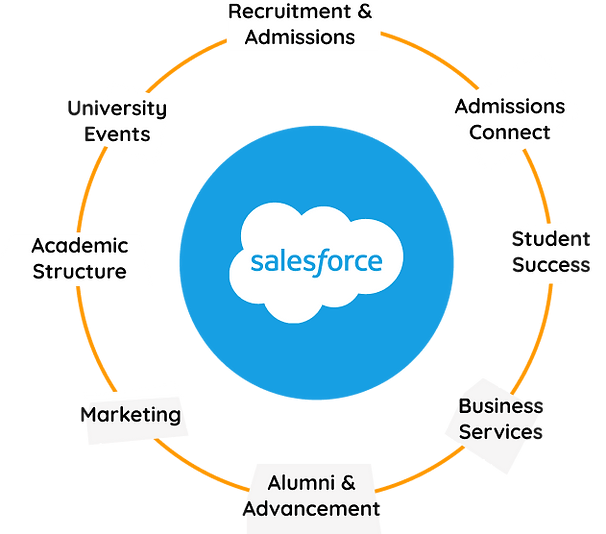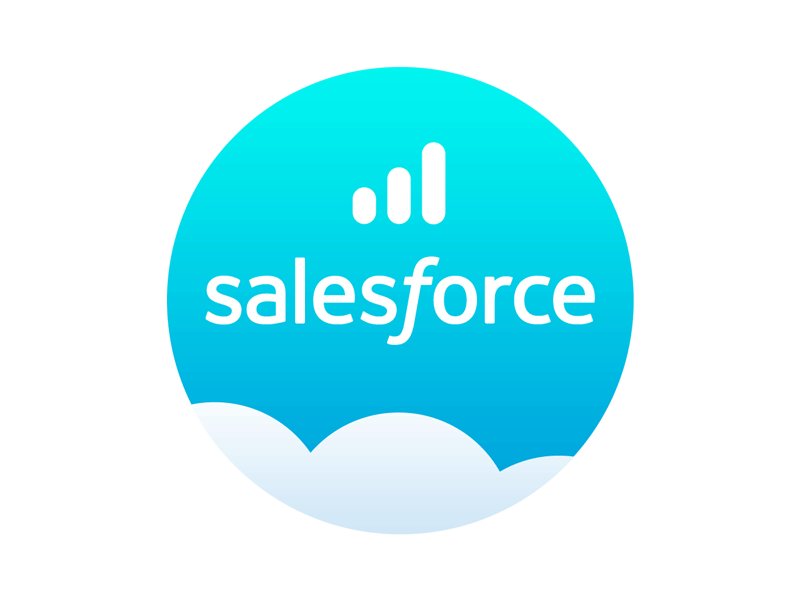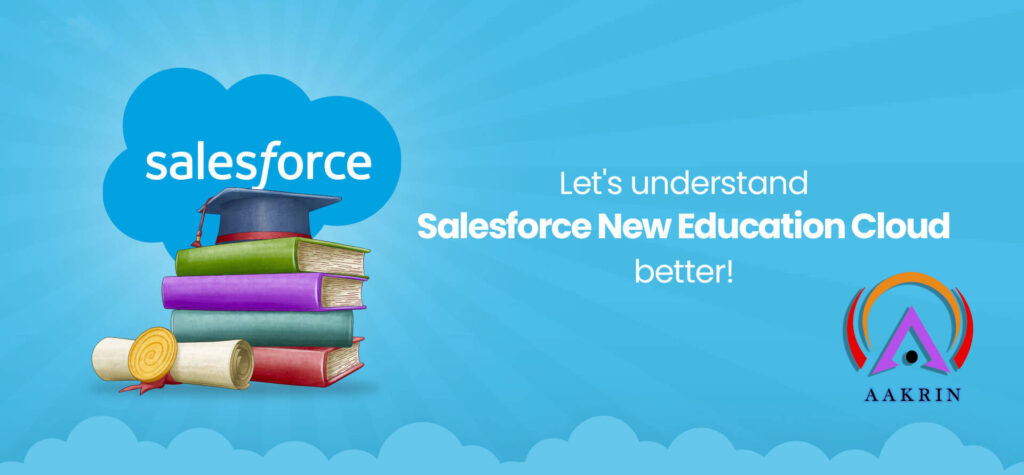
What Is Salesforce Education Cloud? 

Salesforce Education Cloud is an online tool that serves as a digital helper for schools and colleges, gathering all student and teacher information in one secure place. It organizes this data, automates tasks such as planning lessons and tracking attendance, and provides personalized learning experiences. This comprehensive platform not only assists schools in making better decisions but also fosters effective support for students. By offering insights on student performance and enhancing communication between teachers and students, it ultimately boosts student success and satisfaction, making education management easier and more personalized.
- Cloud-Based Platform: Salesforce Education Cloud operates online, allowing educational institutions to access and manage data securely over the internet.
- Unified Student Data: It uses the Salesforce platform and Education Data Architecture (EDA) to create a unified view of student data. This means all information about students, ranging from admissions and financial aid to academic performance and alumni relations, can be centralized and easily accessible.
- Comprehensive Features: The platform includes a wide array of features such as student relationship management, learning analytics, predictive insights, enrollment management, academic advising, alumni relations, and integration with Learning Management Systems (LMS). These features are designed to automate tasks, provide valuable insights, and enhance various aspects of the student lifecycle.
- Personalized Support: Salesforce Education Cloud enables institutions to provide personalized support to students. Through features like marketing automation, analytics, and artificial intelligence capabilities, it facilitates targeted communication and tailored educational experiences.
- Collaboration and Engagement: The platform offers tools for collaboration, student portals, and communication channels. This fosters meaningful connections between students, educators, and institutions.
- 360-Degree Student View: One of its significant advantages is the ability to create a comprehensive, 360-degree view of each student. This view includes their needs, preferences, challenges, and progress. Understanding students in this holistic manner enables personalized engagement and support, ultimately leading to improved student success and satisfaction.


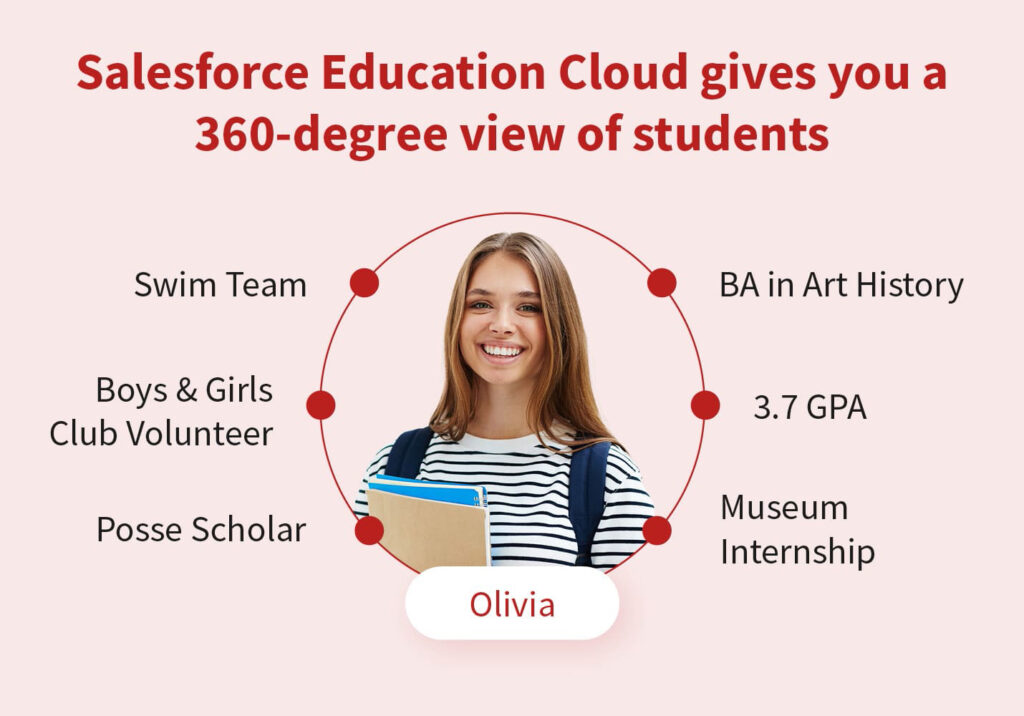

Who can use the Salesforce Education Cloud? 
Salesforce Education Cloud is suitable for schools, colleges, and various educational organizations, including tutoring centers and online platforms. It serves institutions of all sizes, meeting the needs of diverse stakeholders.
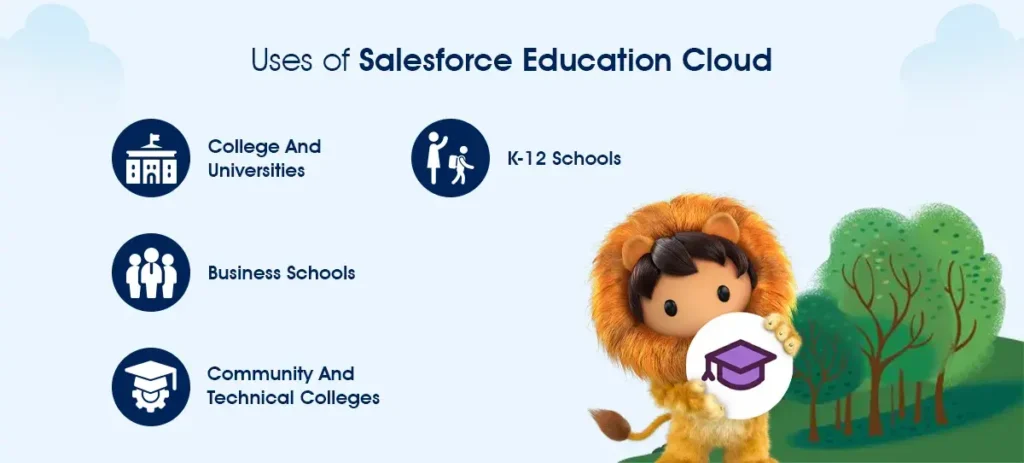
- Schools and Universities: Salesforce Higher Education Cloud streamlines admissions, engages students, and enhances academic advising from K-12 to higher education institutions.
- Admissions and Recruitment Teams: Education Cloud enables personalized communication, automates enrollments, and boosts student yield for admissions and recruitment teams.
- Educators and Faculty: Education Cloud offers unified advising, providing tailored support to students throughout their educational journey.
- Student Services and Advisors: Student support benefits from Education Cloud’s personalized guidance for students.
- Alumni and Development Teams: Education Cloud fosters lifelong alumni relationships, aids fundraising, and engages donors in educational initiatives.
- Financial Services Departments: Education Cloud automates grant and loan processes, ensuring transparent and efficient funding management.
- IT and Administrative Staff: Education Cloud simplifies administrative tasks and ensures a seamless experience for all departments using education-specific tools and automation.
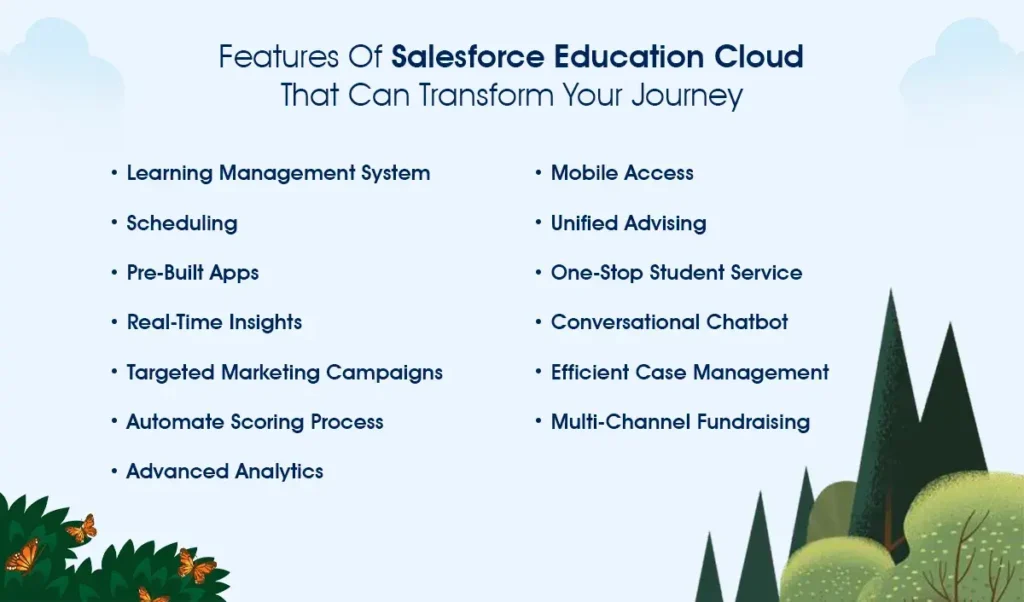
- Learning Management System (LMS):
- What it Does: Supports online learning and course management.
- Benefits: Enables easy creation, delivery, and tracking of digital content. Enhances collaboration between educators and students for a better learning experience.
- Scheduling:
- Features: Helps educators manage class schedules, timetables, and resources efficiently.
- Pre-Built Apps for Learner Journey:
- What They Are: Ready-made apps supporting different stages of learning.
- Advantage: Easily customizable to address unique learner needs.
- Real-Time Insights:
- Benefits: Provides valuable student data for informed decision-making and positive learning outcomes.
- Targeted Marketing:
- Capability: Enables creation of tailored marketing campaigns, reaching the right students with the right messages at the right time and on preferred channels.
- Automated Student Enrollment Scoring:
- Process: Automates and accelerates student enrollment evaluations.
- Advanced Analytics and Forecasting:
- Features: Offers predictive analytics for enhanced student learning experiences.
- Mobile Access and Notifications:
- Advantage: Provides mobile access for on-the-go platform use.
- Feature: Real-time notifications keep users updated about important events and deadlines.
- Unified Advising:
- Benefits: Integrates students, staff, and faculty for unified academic, career, and personal advising.
- One-Stop Student Service Center:
- Features: Empowers staff with tools for record-keeping and collaboration. Helps students find answers and enhances educator-student collaboration.
- Conversational Chatbot:
- Purpose: Provides 24/7 support to staff and students.
- Functionality: Generates automated responses, resolves issues, and offers personalized learning experiences.
- Efficient Case Management:
- Benefits: Centralizes campus activities for support staff. Streamlines case management through automation and customization.
- Multi-Channel Fundraising:
- Usage: Facilitates fundraising campaigns across email, social media, web, etc.
- Advantages: Boosts fundraising success by optimizing strategies across platforms.
What are the benefits/results of the Education Cloud?
As per insights from Salesforce.org customers and findings from the Total Economic Impact Study conducted by Forrester Consulting, the Cloud offers significant benefits and advantages.
- 11% increase in enrolment
- 38% faster response to student needs
- 40% increase in student engagement
- 60% reduction in Information Technology expenses
- 80% improvement in staff productivity
- 195% ROI with a 7 month payback period
- $2.4M total legacy cost savings
- Increase in alumni and donor involvement and funds
